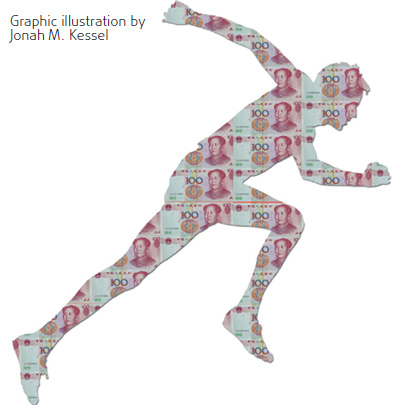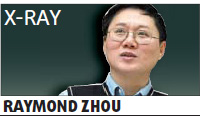Raymond Zhou
The dash for cash
Updated: 2009-09-04 07:59
By Raymond Zhou (China Daily)


She knew how much her parents made every month, but was fully aware this question was a trap. The college student knew it was in her best interests to ignore the question and pray the recruiter would not notice.
It was Zhang's seventh job application and she had learnt from experience.
This is a story recounted in the China Youth Daily and now reposted all over the Web.
The Zhejiang University junior hails from a poor village in neighboring Fujian province, and as she put it, somewhat sarcastically, she had never seen more than ten 100-yuan bills at once and her staple food at home was potatoes. (In China, most feed on rice or wheat products.)
"How can I put that information into the form?" she said.
Zhang was experiencing the fallout of poverty. She may have been enrolled in a prestigious school, but her background of indigence will dog her wherever she goes and cannot be easily cast off.
Essentially it is a stigma that she has to carry around with her, not only through her college years, but crawl all the way into the real world of employment, dating, promotion etc. You can almost call it "the stink of poverty".
The meme in the Chinese language is "the second-generation poor", or pin erdai. It is a new term coined to contrast "the second-generation rich" or fu erdai. Because wealthy families have more resources, their children get to enjoy the fruits of success and lay the foundation for their own future success.
That, in a sense, is to be expected. The hereditary nature of poverty, on the other hand, is shocking because education, especially that from a reputable school of higher learning, is supposed to level the playing field.
If a good student from a good school cannot compete on that alone, what's the use of education?
You may be wondering why employers want to know about a potential employee's family finance.
Shouldn't they take an interest in her potential to make money for the company instead? As a matter of fact, these two are related in the eyes of the recruiters.
If your family is rich, powerful or well connected, you may have an easier time bringing in prospective clients and deals.
If your family lives in a mountain village, your folks won't be valuable even as a sample for market survey.
The China Youth Daily also reported on a graduate named Du Juanjuan, who interned with a Hangzhou newspaper and whose performance won her the promise of a permanent position.
But in the end, she did not land the job, which was later filled by three finalists who were from schools of a lower standing.
Her supervisor whispered to her: "Those three are all local kids from well-to-do families. We'll need them to pull in some advertising revenue."
That's why job-seekers, who have made it despite their family hardships, balk at job interviews in which they'll face inquisition on their lowly roots.
Besides, the process of job hunting imposes a big strain on their precarious finance.
By one account, printing resumes costs 105 yuan ($15), mailing 25 yuan, a formal suit 450 yuan and communication 250 yuan.
If you include travel and accommodation for cross-country interviews, the cost can balloon to thousands of yuan.
And given the competitiveness of the job market, employers do not reimburse any of that cost yet they often invite a legion of hopefuls for face-to-face interviews out of which they pick only a handful.
The financial strain, coupled with psychological stress, makes job searching a painful experience.
Against this backdrop you throw a plethora of news stories about rich kids who flaunt their designer wear, race cars, or overseas stints and start-ups, let alone negative coverage such as the hit-and-run incidents, and you'll understand why the "I-hate-the-rich campaign" is running rampant like a wild fire.
This is a dangerous sign of the deepening rift that cuts across our society.
Granted, there is no ideal society anywhere, any time. A high-growth period like China's comes with the natural corollary of a growing wealth gap. It's unavoidable.
However I often comfort myself as I travel around the country because even in the remotest places I notice discernible progress.
Even the poorest have improved their lives in the past two or three decades.
The river of prosperity is buoying and elevating all vessels, big and small.
Yet, one cannot deny that the poor are feeling poorer than before. It's the result of comparison. They see their neighbors building bigger houses. They watch on TV lifestyles of urban dwellers.
No demographic has a more acute sense of such misery than college students from lower social classes.
They are thrust into an environment where wealth is no longer images of luxury on the screen, but what their dorm mates use and buy - in close proximity to their own humble and meager living.
Envy rears its ugly head, and then shame. That does not take into account the ridicule and sneer they have to endure from snobbish peers.
China has a culture that emphasizes family background. One is often introduced as someone's son, grandson, or in some extreme cases the umpteenth descendent, or distant relative of many degrees apart, of a person of fame or stature.
To explain personal achievement, we usually dig into the family roots and study their "proper upbringing".
Rarely do we highlight those who overcome all kinds of odds and excel at something totally strange to their parents.
Even now there are people who prefer Chen Kaige to Zhang Yimou mainly because the former grew up in a filmmaker's family while the latter was toiling in a factory.
But Zhang's daughter, if she shows a willingness to dip into the film industry, would surely be given more chances because people will assume she has naturally inherited some of her father's talent.
Chairman Mao's revolution, in an attempt to transform the custom, went to great lengths to extol the virtues of the proletariat and denounce property owners.
It largely failed to achieve its goal of equality as it only shifted different people into the enviable positions of power.
With economic reform, channels for upward mobility have been exponentially increased.
Military service and college education are no longer the only two ways into middle class. But those left behind are faced with the unmasked reality of seeing the rest of the world, especially the rich and powerful, speeding ahead while lamenting their own lack of proper economic means to get ahead.
The greatest irony is higher education, which theoretically places the young, regardless of family income, at the same starting line.
Yet the high cost and inadequate subsidy often drag them further behind, leaving them with a mountain of debt and a dimmer prospect for a decent job.
No wonder they give job hunting the nickname of "pindie game", which means "the competition of dads".
And it's not surprising poor dads tend to lose.
The silver lining to this cloud is the emergence of assistance programs at various placement centers, from universities to local governments. It will ease some of the pain for the second-generation poor.
But in the long term, it will take a change of national mindset to dissociate one's personal strength from his or her family status.
Specials

President Hu visits the US
President Hu Jintao is on a state visit to the US from Jan 18 to 21.

Fossil mom helps shed light on ancient life
The discovery of the fossile of a female pterosaur nicknamed as Mrs T and her un-laid egg are shedding new light on ancient mysteries.

Economic figures
China's GDP growth jumped 10.3 percent year-on-year in 2010, boosted by a faster-than-expected 9.8 percent expansion in the fourth quarter.